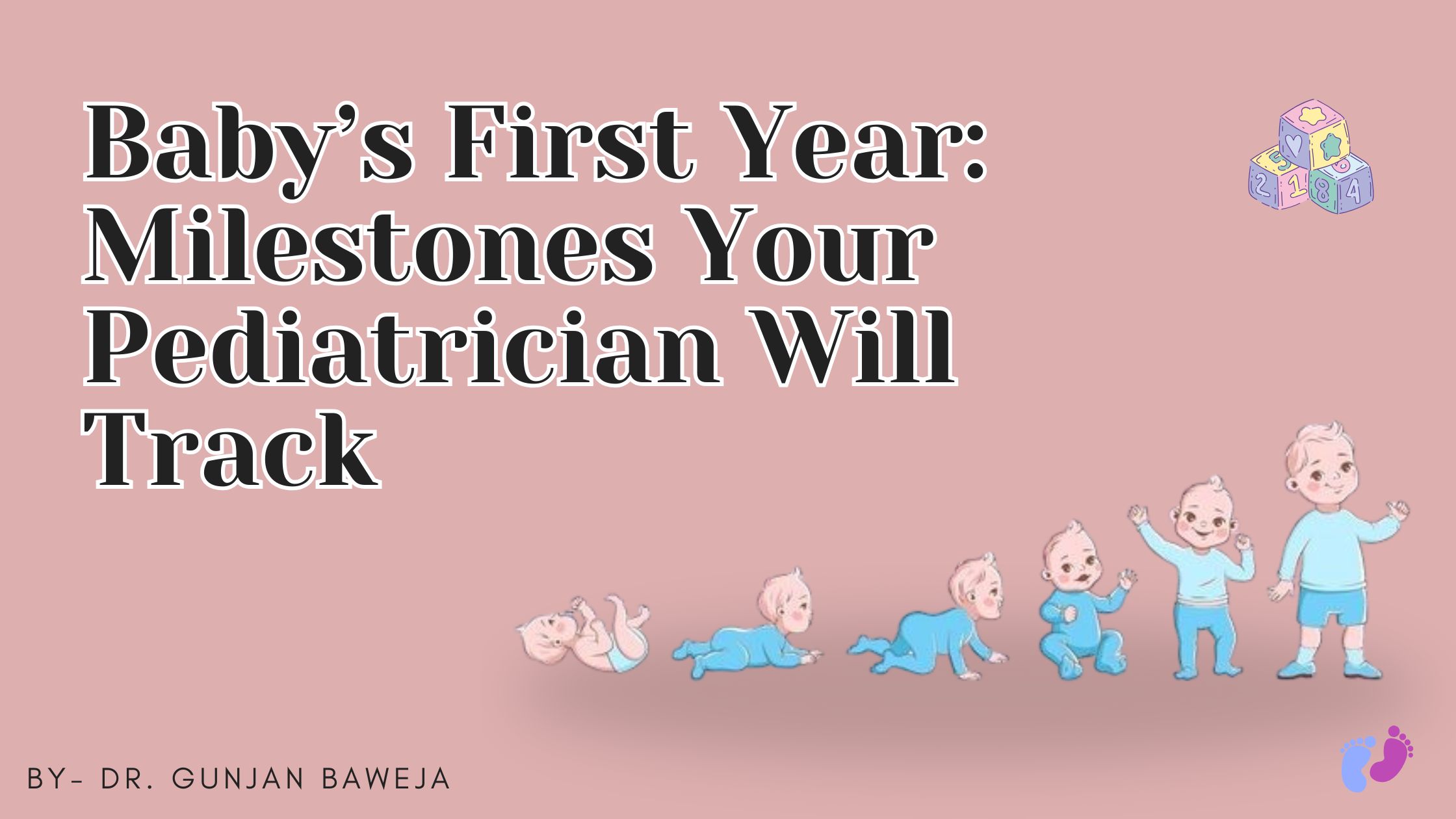Your baby’s first year is full of exciting changes and developments! During this
time, your pediatrician will closely monitor your baby’s growth and track
important milestones. These milestones help ensure your baby is developing
healthily in areas such as movement, speech, and social skills.
Let’s walk through the key milestones your pediatrician will track in your
baby’s first year, with simple examples for each stage.

1. Newborn Stage (0-2 Months)
In the first couple of months, your newborn is adjusting to life outside the
womb. Your pediatrician will check for basic reflexes and early developmental
signs.
What to Expect:
Movement: Newborns should have a startle reflex (jumping at loud noises)
and be able to lift their heads briefly during tummy time.
Social: They may start to make eye contact and recognize familiar voices,
especially mom and dad.
Example: When you talk to your baby, they may turn their head toward the
sound of your voice. This is a great sign that they are developing their hearing
and social awareness.
2. 3-4 Months: Early Motor Skills
By 3-4 months, your baby becomes more aware of their surroundings. Your
pediatrician will check for physical development and social engagement.
What to Expect:
Motor Skills: Your baby should be able to hold their head up more steadily and
may start to reach for objects or grasp toys.
Communication: Around this time, babies begin cooing and babbling, trying to
communicate with sounds.
Social: They might start smiling more, especially in response to your voice or
faces.
Example: When you offer a rattle, your baby may reach out and grasp it. Your
pediatrician will celebrate this as a milestone in their hand-eye coordination.
3. 5-6 Months: Rolling and Sitting
Around 5-6 months, babies become more mobile and curious about their
environment. This is the stage when many key motor skills start to develop.
What to Expect:
Movement: Your baby may start rolling from tummy to back and might begin
trying to sit with support.
Speech: You may notice more babbling, especially sounds like “ba-ba” or
“ma-ma.”
Social: Babies begin to recognize familiar people and may express excitement
when they see their caregivers.
Example: During tummy time, your baby might roll over for the first time! Your
pediatrician will be thrilled to hear this and might give you tips on how to
encourage more movement.
4. 7-9 Months: Crawling and Exploring
By 7-9 months, your baby is likely crawling or scooting around, exploring their
world with more independence.
What to Expect:
Movement: Babies usually start to crawl or pull themselves up to stand using
furniture.
Fine Motor Skills: They can pick up small objects with a pincer grasp (using
thumb and finger).
Communication: Babies at this stage may start to understand basic words like
“no” or “bye-bye” and wave in response.
Example: You might notice your baby picking up a small piece of food
between their thumb and index finger. This is a sign of improved hand
coordination, which your pediatrician will check during visits.
5. 10-12 Months: Standing and First Words
The final months of your baby’s first year are full of exciting developments,
including standing and possibly walking!
What to Expect:
Movement: Babies may start to stand on their own, cruise along furniture, or
even take their first steps!
Speech: Your baby may say their first clear words, such as “mama” or “dada.”
Social: Babies enjoy playing simple games like peek-a-boo and may show
affection by hugging or clapping.
Example: If your baby pulls themselves up on the coffee table and takes a few
wobbly steps, it’s time to celebrate! Your pediatrician will be excited to track
this milestone and ensure their gross motor skills are on track.
Key Developmental Checks with Your Pediatrician
Throughout the first year, your pediatrician will carefully monitor:
Growth: Height, weight, and head circumference will be tracked to make sure
your baby is growing steadily.
Vision and Hearing: Regular checks will ensure your baby’s senses are
developing properly.
Vaccinations: Your pediatrician will keep your baby up to date with necessary
vaccines, protecting them from preventable diseases.
Conclusion
Your baby’s first year is an incredible journey filled with important milestones.
Each time your baby reaches a new milestone, it’s a sign of healthy growth
and development. Your pediatrician plays a key role in tracking these
milestones, offering guidance, and ensuring your baby’s progress stays on
course.
From first smiles to first steps, every achievement is a reason to celebrate! Be
sure to ask your pediatrician any questions or concerns you may have as you
watch your little one grow during this magical first year.






